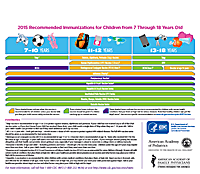Meningococcal Vaccine Safety
Meningococcal Disease and How to Protect Against It
Meningococcal disease can refer to any illness that is caused by the type of bacteria called Neisseria meningitidis, also known as meningococcus. These illnesses are often severe and include infections of the lining of the brain and spinal cord (meningitis) and bloodstream infections (bacteremia or septicemia). Neisseria meningitidis is a leading cause of bacterial meningitis in children 2 through 18 years old in the United States. You can protect against these diseases with safe, effective vaccination.
Meningococcal Vaccine Side Effects
Meningococcal vaccines are very safe, and they are effective at preventing meningococcal disease. Vaccines, like any medicine, can have side effects. The most common side effects with meningococcal vaccines are mild, like a sore arm, and usually last no more than 1 or 2 days.
Common Side Effects of Meningococcal Vaccine:
- Sore arm from the shot
- Feeling tired
- Headache
A small percentage of people who get the vaccine develop a fever. On very rare occasions, people may have severe (anaphylactic) allergic reactions to meningococcal vaccines.
Available Meningococcal Vaccines
There are six different vaccines available in the United States to protect against Neisseria meningitidis bacteria. Which vaccine a person should get depends on their age and other factors. Some people should get one vaccine to protect against meningococcal types A, C, W, Y, and a second vaccine to protect against meningococcal type B. See CDC’s guidelines or talk to your doctor to decide which of these vaccines is right for you.
There are three vaccines to protect against Neisseria meningitidis bacteria types A, C, W, and Y:
- Menomune [PDF – 347 KB]: The Food and Drug Administration (FDA) approved this vaccine in 1981. It is approved for use in people 2 years of age and older. It is the only meningococcal vaccine licensed for people older than 55 years of age.
- Menactra [PDF – 253 KB]: FDA approved this vaccine in 2005. It is approved for use in people aged 9 months through 55 years of age.
- Menveo [PDF – 1.06 MB]: FDA approved this vaccine in 2010. It is approved for use in people aged 2 months through 55 years of age.
There is one vaccine to protect against Neisseria meningitidis bacteria types C and Y intended specifically for infants and toddlers:
- MenHibrix [PDF – 1.43 MB]: FDA approved this vaccine in 2012. It provides protection against two meningococcal serogroups along with Haemophilus influenzae type b (Hib). It is approved for use in children aged 6 weeks through 18 months of age.
There are two vaccines to protect against Neisseria meningitidis bacteria type B:
- Trumenba [PDF – 253 KB]: FDA approved this vaccine in 2014 for use in people 10 through 25 years of age.
- Bexsero [PDF – 142 KB]: FDA approved this vaccine in 2015 for use in people 10 through 25 years of age.
How CDC Monitors Meningococcal Vaccine Safety
CDC and FDA continuously monitor the safety of vaccines after they are approved. If a problem is found with a vaccine, CDC and FDA will inform health officials, health care providers, and the public.
CDC uses three systems to monitor vaccine safety:
- The Vaccine Adverse Event Reporting System (VAERS): an early warning system that helps CDC and FDA monitor problems following vaccination. Anyone can report possible vaccine side effects to VAERS.
- The Vaccine Safety Datalink (VSD): a collaboration between CDC and nine health care organizations which allows ongoing monitoring and proactive searches of vaccine-related data.
- The Clinical Immunization Safety Assessment (CISA) Project: a partnership between CDC and several medical centers that conducts clinical research on vaccine-associated health risks.
A Closer Look at the Safety Data
- In 2008, reports to VAERS suggested a potential for an increased risk of Guillain–Barré syndrome (GBS) following Menactra vaccination. The package inserts for two of the meningococcal vaccines were changed to identify a history of GBS as a precaution to vaccination. Following the VAERS study, two large safety studies were done to evaluate the risk of GBS after vaccination with Menactra. The two studies combined found that the risk for GBS after Menactra was not increased over the usual (non-vaccine related) GBS rate among 11 to 21 year olds. Based on these large studies, the Advisory Committee on Immunization Practices (ACIP) no longer considers a history of GBS to be a contraindication nor precaution for meningococcal vaccination. Read more about GBS and Menactra.
More Resources
- Meningococcal Vaccine Information Statement
- Meningococcal Vaccines: Who Should Not be Vaccinated?
- Meningococcal Vaccination
- Meningococcal: Who Needs to be Vaccinated?
- Serogroup B meningococcal outbreaks
Related Scientific Articles
CDC. Guillain-Barré Syndrome among recipients of Menactra meningococcal conjugate vaccine- United States, June-July 2005. MMWR. 2005 Oct 6:54(Dispatch);1-3.
Cohn AC, MacNeil JR, Clark TA, Ortega-Sanchez IR, Briere EZ, et al. Prevention and Control of Meningococcal Disease: Recommendations of the Advisory Committee on Immunization Practices (ACIP). MMWR. 22 March 2013;62(RR02):1-22.
Velentgas P, Amato AA, Bohn R, et al. Risk of Guillain-Barré syndrome after meningococcal conjugate vaccination. Pharmacoepidemiol Drug Saf. 2012 Dec;21(12):1350-8
Yih WK, Weintraub E, Kulldorff M. No risk of Guillain-Barré syndrome found after meningococcal conjugate vaccination in two large cohort studies. Pharmacoepidemiol Drug Saf. 2012 Dec;21(12):1359-60.
- Page last reviewed: October 27, 2015
- Page last updated: November 23, 2015
- Content Source:


 ShareCompartir
ShareCompartir
